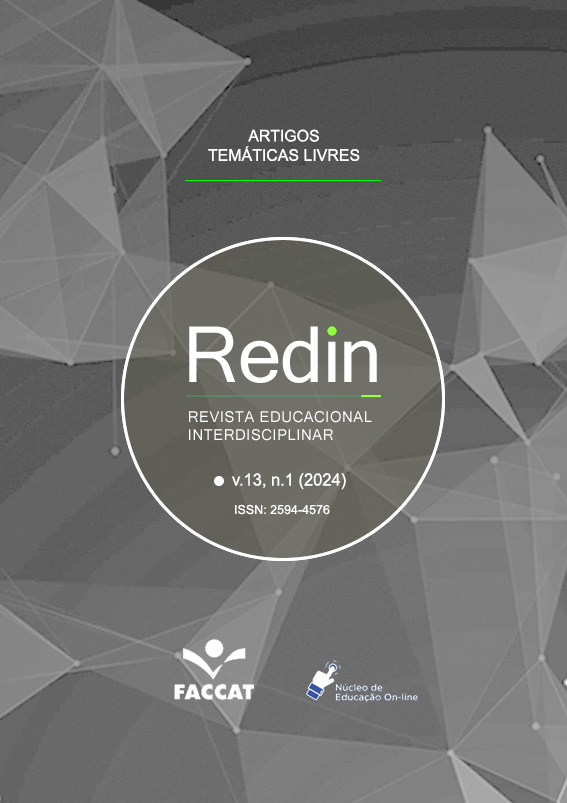Teacher planning in the digital age:
the use of open educational resources
Abstract
The aim of this research was to analyze the process of incorporating open educational resources into teacher planning in a municipal school in the interior of the state of São Paulo. The methodology consisted of a qualitative approach based on research-training in cyberculture. Ten teachers from the early years of elementary school took part in the research. The data collection instruments used were a questionnaire to collect the profile of the participants and a round table discussion to understand the teachers' knowledge and actions on the subject of planning the teaching process and open educational resources. These instruments helped to create a teacher training program. The data was analyzed by reading the data and comparing it to the theoretical framework, creating the axis of analysis of the choice of educational resources in teacher planning. The analysis made it possible to affirm that, when choosing educational resources, licenses must be respected and open educational resources must be prioritized.
Keywords: Teacher training; Pedagogical planning; Open educational resources.
References
ALMEIDA, M. E. B.; VALENTE, J. A. Tecnologias e currículo: trajetórias convergentes ou divergentes? São Paulo: Paulus, 2011.
ARARIPE, J. P. G. A.; LINS, W. C. B. Competências Digitais na Formação Inicial de Professores. São Paulo: CIEB; 2020.
BRASIL. Ministério da Educação. Base Nacional Comum Curricular. Brasília, 2018.
BRASIL. Presidência da República. Lei nº 9.610, de 19 de fevereiro de 1998. Altera, atualiza e consolida a legislação sobre direitos autorais e dá outras providências. Brasília, DF: Casa Civil, 1998. Disponível em: https://www.planalto.gov.br/ccivil_03/leis/l9610.htm. Acesso em: 07 jul. 2024.
CARVALHO, R. As tecnologias no cotidiano escolar: possibilidades de articular o trabalho pedagógico aos recursos tecnológicos. Disponível em: http://www.diaadiaeducacao.pr.gov.br/portals/pde/arquivos/1442-8.pdf. Acesso em: 11 jan. 2024.
FURNIEL, A. C. M.; MENDONÇA, A. P. B; SILVA, R. M. Recursos Educacionais Abertos: conceitos e princípios. (Guia sobre Recursos Educacionais Abertos). FIOCRUZ. Disponível em: https://campusvirtual.fiocruz.br/portal/guiarea/assets/files/Guia1.pdf. Acesso em: 24 out. 2023.
LIBÂNEO, J. C. Didática. São Paulo: Cortez, 1994.
LIBÂNEO, J. C. et al. Educação escolar: políticas, estrutura e organização. São Paulo: Cortez, 2007.
MACHADO, D.; CAZINI, J. Inclusão e Educação. Belo Horizonte: Atena, 2019.
MORAN, J. et al. Novas tecnologias e mediação pedagógica. Campinas: Papirus, 2000.
PADILHA, P. R. Planejamento Dialógico: Como construir o projeto político-pedagógico da escola. São Paulo: Cortez, 2001.
SANTOS, E. Pesquisa-formação na cibercultura. Teresina: Edufpi, 2019.
SEBRIAM, D. Iniciativa Educação Aberta. 2013. Disponível em: https://aberta.org.br/debora-sebriam-3/. Acesso em: 09 jun. 2024.
SILVA, A. C. da. Educação e tecnologia: entre o discurso e a prática. Ensaio: Avaliação e Políticas Públicas em Educação, v. 19, n. 72, p. 527-554, 2011.
SILVA, J. B.; BILESSIMO, S. M. S.; MACHADO, L. R. Integração de tecnologia na educação: proposta de modelo para capacitação docente inspirada no tpack. Educação em Revista, Belo Horizonte, v. 37, p. 1-23, 2021.
STACEY, P. Creative Commons licenses explained. 2015. Disponível em https://pt.slideshare.net/Paul_Stacey/bccampus-open-textbook-workshop. Acesso em: 21 de jan. 2024.
VILAÇA, M. L. C.; ARAUJO, E. V. F. Tecnologia, Sociedade, e Educação na Era Digital. Duque de Caxias: Universidade Unigranrio, 2016.


